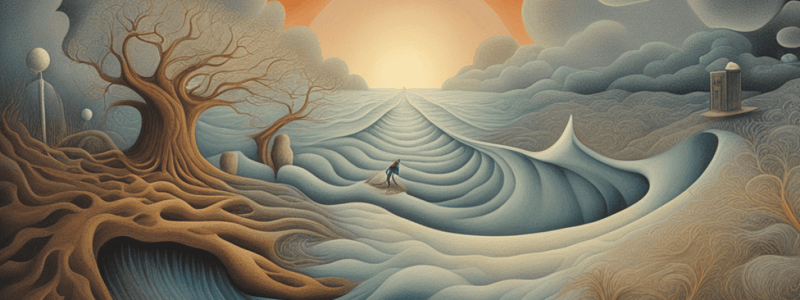Podcast
Questions and Answers
What is the significance of the Anglo-Saxon tribes arriving from Germany?
What is the significance of the Anglo-Saxon tribes arriving from Germany?
Which literary work is NOT mentioned in the text as a significant contribution to English literature?
Which literary work is NOT mentioned in the text as a significant contribution to English literature?
Which period saw the culmination of Early Modern English?
Which period saw the culmination of Early Modern English?
Who is the author of the novel 'To the Lighthouse'?
Who is the author of the novel 'To the Lighthouse'?
Signup and view all the answers
Which genre is considered the oldest within English literature?
Which genre is considered the oldest within English literature?
Signup and view all the answers
Which literary movement challenged traditional beliefs through metaphysical poetry?
Which literary movement challenged traditional beliefs through metaphysical poetry?
Signup and view all the answers
During which century did novel writing emerge in England?
During which century did novel writing emerge in England?
Signup and view all the answers
Which author explored tales of adventure through works like 'Robinson Crusoe'?
Which author explored tales of adventure through works like 'Robinson Crusoe'?
Signup and view all the answers
Which literary form encompasses narrative forms like novella, short story, and essay?
Which literary form encompasses narrative forms like novella, short story, and essay?
Signup and view all the answers
Who are some notable dramatists from the past mentioned in the text?
Who are some notable dramatists from the past mentioned in the text?
Signup and view all the answers
Study Notes
English: A Timeless Language of Literature and Expression
English has evolved over centuries into one of the most widely spoken languages globally. In this exploration, we'll delve into its literary aspects, illuminating the beauty and significance of English literature.
A Glance Back in Time
The origins of modern English go back to ancient times when Anglo-Saxon tribes arrived from Germany during the fifth century AD, bringing Old English with them. This dialect changed significantly due to invasions by Vikings, Normans, and other cultures, leading to the development of Middle English around 1100 CE and finally culminating in Early Modern English in the late fifteenth century. By the nineteenth century, the standard form of written and spoken English had been established.
A Literary Legacy
English literature can trace roots back to Beowulf and Anglo-Saxon epics, spanning diverse genres including poetry, prose, drama, novels, short stories, essays, and more. It has produced compelling works such as William Shakespeare's plays like Romeo & Juliet and Hamlet; Charles Dickens' novels Oliver Twist and Great Expectations; Virginia Woolf's To the Lighthouse; T. S. Eliot's poems like The Love Song of J. Alfred Prufrock; Jane Austen's Pride and Prejudice; George Orwell's Animal Farm; and many others.
Poetry's Rich Tradition
Poetry is often considered the oldest genre within English literature. From Chaucerian ballads to Elizabethan sonnets, beautiful verses have always captured the hearts and minds of readers. John Donne's metaphysical poetry challenged traditional beliefs. Romantic period poets like Lord Byron and Percy Shelley expanded artistic boundaries through their themes and styles. Today, contemporary poets continue to explore innovative forms and motifs.
Prose and Drama
Prose encompasses various narrative forms — novel, novella, short story, essay, etc. — offering insightful depictions of human experiences. Nineteenth-century authors presented characters and societal issues through realism while twentieth-century writers experimented with postmodern techniques. Notable dramatists like Christopher Marlowe, Ben Jonson, William Congreve, and William Shakespeare wrote masterpieces still performed today.
Novels and Short Stories
Novel writing emerged in eighteenth-century England, providing engaging narratives covering wide-ranging subjects. Daniel Defoe's Robinson Crusoe told tales of adventure, while Charlotte Bronte's Jane Eyre explored complex relationships. Contemporary fiction explores multifaceted themes through novels like Margaret Atwood's Blind Assassin or Zadie Smith's Swing Time. Essential short story collections abound too, such as O. Henry's Gift of Magi and Flannery O'Connor's Everything That Rises Must Converge.
As you dive deeper into the world of English literature, remember it is an evolving field shaped by countless voices expressing unique perspectives. Whether you prefer the lyrical flow of poetry, gripping plots of drama, captivating threads of prose, or vivid imagery of illustrations, there's something for everyone who appreciates storytelling and wordcraft in our native tongue.
Studying That Suits You
Use AI to generate personalized quizzes and flashcards to suit your learning preferences.
Description
Delve into the rich tapestry of English literature from its ancient roots in Old English to the modern-day masterpieces. Discover the evolution of poetry, prose, drama, novels, and short stories that have shaped the literary landscape over centuries.



